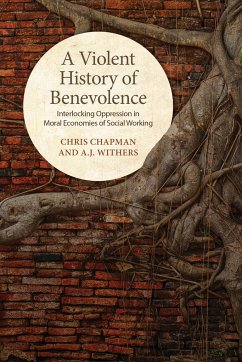Chris Chapman, A J Withers
A Violent History of Benevolence
Interlocking Oppression in the Moral Economies of Social Working
Chris Chapman, A J Withers
A Violent History of Benevolence
Interlocking Oppression in the Moral Economies of Social Working
- Broschiertes Buch
- Merkliste
- Auf die Merkliste
- Bewerten Bewerten
- Teilen
- Produkt teilen
- Produkterinnerung
- Produkterinnerung
A Violent History of Benevolence traces how standard histories of liberalism, progress, and social work are inextricable from systemic violences of colonialism, racism, disablism, cisheteropatriarchy, eugenics, and capitalism.
Andere Kunden interessierten sich auch für
![Living and Working with Schizophrenia Living and Working with Schizophrenia]() Joel JeffriesLiving and Working with Schizophrenia39,99 €
Joel JeffriesLiving and Working with Schizophrenia39,99 €![Dr. Boerhaave's Academical Lectures on the Theory of Physic: Being a Genuine Translation of His Institutes and Explanatory Comment, Collated and Adjus Dr. Boerhaave's Academical Lectures on the Theory of Physic: Being a Genuine Translation of His Institutes and Explanatory Comment, Collated and Adjus]() Herman BoerhaaveDr. Boerhaave's Academical Lectures on the Theory of Physic: Being a Genuine Translation of His Institutes and Explanatory Comment, Collated and Adjus27,99 €
Herman BoerhaaveDr. Boerhaave's Academical Lectures on the Theory of Physic: Being a Genuine Translation of His Institutes and Explanatory Comment, Collated and Adjus27,99 €![Psychosis, Psychiatry and Psychospiritual Considerations Psychosis, Psychiatry and Psychospiritual Considerations]() Brian SpittlesPsychosis, Psychiatry and Psychospiritual Considerations50,99 €
Brian SpittlesPsychosis, Psychiatry and Psychospiritual Considerations50,99 €![Mental Disorder in Canada Mental Disorder in Canada]() John CairneyMental Disorder in Canada47,99 €
John CairneyMental Disorder in Canada47,99 €![When the Mind Fails When the Mind Fails]() Arthur FishWhen the Mind Fails33,99 €
Arthur FishWhen the Mind Fails33,99 €![Cold War Triangle Cold War Triangle]() Renilde LoeckxCold War Triangle23,99 €
Renilde LoeckxCold War Triangle23,99 €![Molecules, Madness, and Malaria: How Victorian Fabric Dyes Evolved into Modern Medicines for Mental Illness and Infectious disease (Black and White Ed Molecules, Madness, and Malaria: How Victorian Fabric Dyes Evolved into Modern Medicines for Mental Illness and Infectious disease (Black and White Ed]() Wallace B. MendelsonMolecules, Madness, and Malaria: How Victorian Fabric Dyes Evolved into Modern Medicines for Mental Illness and Infectious disease (Black and White Ed10,99 €
Wallace B. MendelsonMolecules, Madness, and Malaria: How Victorian Fabric Dyes Evolved into Modern Medicines for Mental Illness and Infectious disease (Black and White Ed10,99 €-
-
-
A Violent History of Benevolence traces how standard histories of liberalism, progress, and social work are inextricable from systemic violences of colonialism, racism, disablism, cisheteropatriarchy, eugenics, and capitalism.
Hinweis: Dieser Artikel kann nur an eine deutsche Lieferadresse ausgeliefert werden.
Hinweis: Dieser Artikel kann nur an eine deutsche Lieferadresse ausgeliefert werden.
Produktdetails
- Produktdetails
- Verlag: University of Toronto Press
- Seitenzahl: 536
- Erscheinungstermin: 20. Februar 2019
- Englisch
- Abmessung: 229mm x 156mm x 35mm
- Gewicht: 803g
- ISBN-13: 9781442628861
- ISBN-10: 1442628863
- Artikelnr.: 52415274
- Herstellerkennzeichnung
- Libri GmbH
- Europaallee 1
- 36244 Bad Hersfeld
- gpsr@libri.de
- Verlag: University of Toronto Press
- Seitenzahl: 536
- Erscheinungstermin: 20. Februar 2019
- Englisch
- Abmessung: 229mm x 156mm x 35mm
- Gewicht: 803g
- ISBN-13: 9781442628861
- ISBN-10: 1442628863
- Artikelnr.: 52415274
- Herstellerkennzeichnung
- Libri GmbH
- Europaallee 1
- 36244 Bad Hersfeld
- gpsr@libri.de
By Chris Chapman and A.J. Withers
List of Illustrations
Acknowledgments
Introduction
Social Working, Interlocking Oppression, and Moral Economies
A Brief Discussion of Some Indigenous Social Workings on This Land
Organization and Structure of A Violent History of Benevolence
Part One: Deconstructing Social Work and Social Work History
1 Troubling the Standard Account of Social Work
The Standard Account
The Pull of the Other Side of the River
Charity Organization Societies: Beyond Friendly Visiting to the Poor
Settlement Houses and Jane Addams
The New "Social Work"
What the Established Riverbanks Obscure
Contemporary Charity Organization and the Continued Polarity of the
Riverbanks
"Mingling" as Continued Solution to Structural Violence
Conclusion
2 White Supremacy and the Erasure of Racialized Social Workers
Social Work History as White Social Work History
Black Churches: Bestowing Charity and Organizing for Change
"Separate Spheres" and Women’s Clubs
The Great Migration: Migrant Assistance and the Shift towards Black
Incarceration
Black Settlement Houses
Woman’s Christian Temperance Union
Anti-Lynching
Ida B. Wells-Barnett
White Social Work and Anti-Lynching
Maggie L. Walker and the Independent Order of St Luke
The Social Work Profession, Social Science, and Education
Black Social Work in Canada
Settlements in Canada
Anti-Slavery Societies and Black Immigrant Assistance
Social Services
Class Stratification and How It Interlocked with Racism and Social Work
Early Women Social Workers and Gender Roles
Subjugated Community-Based Social Workings Beyond Black and White
Conclusion
3 Social Work as Displacement, Denigration, Cisheteropatriarchalization
Professional Social Work as the Delegitimization of Local Practices and
People
Centring Imperialist Displacement; Decentring Ruling Class White
Exceptionality
Cisheteropatriarchalization as an Advancing White Ruling Class Moral
Economy
Early Professional Social Work and Cisheteropatriarchy
The Ethic of the Healing Power of Domination and Imagined Moral Superiority
An Initial Shift in the Ethic of Relating Across Difference: The Knights
Hospitaller
Claims of Relative Innocence, Part One: Progressive and Secular Dividing
Practices
Claims of Relative Innocence, Part Two: Knowing It Was Wrong
Conclusion
Part Two: Interlocking Genealogies of the Ethic of the Healing Power of
Domination and Imagined Moral Superiority
4 Knowing Better: Liberalism, Instrumental Violence, and Making New Humans
What We Like to Say; What We Actually Do
Claims of Relative Innocence, Part Three: Interpreting Others’ Motivations
Further Standardizing Instrumental Violence: The Theresian Criminal
Constitution
Kant’s Enlightened Morality: Rational Self-Assurance and the Birth of the
"New Man"
Gentle Instrumental Violences, Part One: Rationalizing Colonial Education
Gentle Instrumental Violences, Part Two: Continual Observation and Coerced
Penitence
Gentle Instrumental Violences, Part Three: Psychiatry, Unchaining, and
Moral Treatment
Surveillance, Sorting, and Scientific Stratification
The Validation and Invalidation of the Invalid: Emergent Social Welfare
Policy
The Validation and Invalidation of the "Indian": 1800s White Settler
Colonial Policy
Legislated Exclusions: Racialized and Disablist Immigration Policies
Conclusion
5 Rehabilitation/Eugenics
The Moral Economy of Rehabilitation
The Origins of Rehabilitation before the First World War
Soldiers, Sailors, and Sameness
Medical, Economic, and Civil Rehabilitation
Overcoming Disability
Nationalizing Rehabilitation
Professional Social Work and Rehabilitation
Rehabilitation and the Enforcement of Cisheteronormativity
Rehabilitation/Eugenics and Whiteness/Nationality/Citizenship
Conclusion
6 Assimilation/Genocide
The Moral Economy of Assimilation
Destroying Lives
The Unquestionable Good of Imposing Whiteness onto Others
Destroying Lifeworlds
White Supremacy and Care
Conclusion
7 What If It Isn’t Getting Better? What Do We Do Then?
The Significance of Implicating Ourselves in Interlocking Legacies of
Violence
Is It Getting Better?
Still "Forcibly Transferring Children of the Group to Another Group"
Towards Addressing the Chronic Gap between What We Say and What We Do
Navigating Inherently Oppressive Systems: The Everyday Life of Many a
Social Worker
Moving Forward: Learning from Social Movements and Displaced Practices
Disability Justice and the Democratic Redistribution of Dependence and Care
Conclusion
Conclusion: The Varied Paths That Brought Us Here
Timeline: Selected Events from the Age of Enlightenment through the
Progressive Era
Notes
References
Index
Acknowledgments
Introduction
Social Working, Interlocking Oppression, and Moral Economies
A Brief Discussion of Some Indigenous Social Workings on This Land
Organization and Structure of A Violent History of Benevolence
Part One: Deconstructing Social Work and Social Work History
1 Troubling the Standard Account of Social Work
The Standard Account
The Pull of the Other Side of the River
Charity Organization Societies: Beyond Friendly Visiting to the Poor
Settlement Houses and Jane Addams
The New "Social Work"
What the Established Riverbanks Obscure
Contemporary Charity Organization and the Continued Polarity of the
Riverbanks
"Mingling" as Continued Solution to Structural Violence
Conclusion
2 White Supremacy and the Erasure of Racialized Social Workers
Social Work History as White Social Work History
Black Churches: Bestowing Charity and Organizing for Change
"Separate Spheres" and Women’s Clubs
The Great Migration: Migrant Assistance and the Shift towards Black
Incarceration
Black Settlement Houses
Woman’s Christian Temperance Union
Anti-Lynching
Ida B. Wells-Barnett
White Social Work and Anti-Lynching
Maggie L. Walker and the Independent Order of St Luke
The Social Work Profession, Social Science, and Education
Black Social Work in Canada
Settlements in Canada
Anti-Slavery Societies and Black Immigrant Assistance
Social Services
Class Stratification and How It Interlocked with Racism and Social Work
Early Women Social Workers and Gender Roles
Subjugated Community-Based Social Workings Beyond Black and White
Conclusion
3 Social Work as Displacement, Denigration, Cisheteropatriarchalization
Professional Social Work as the Delegitimization of Local Practices and
People
Centring Imperialist Displacement; Decentring Ruling Class White
Exceptionality
Cisheteropatriarchalization as an Advancing White Ruling Class Moral
Economy
Early Professional Social Work and Cisheteropatriarchy
The Ethic of the Healing Power of Domination and Imagined Moral Superiority
An Initial Shift in the Ethic of Relating Across Difference: The Knights
Hospitaller
Claims of Relative Innocence, Part One: Progressive and Secular Dividing
Practices
Claims of Relative Innocence, Part Two: Knowing It Was Wrong
Conclusion
Part Two: Interlocking Genealogies of the Ethic of the Healing Power of
Domination and Imagined Moral Superiority
4 Knowing Better: Liberalism, Instrumental Violence, and Making New Humans
What We Like to Say; What We Actually Do
Claims of Relative Innocence, Part Three: Interpreting Others’ Motivations
Further Standardizing Instrumental Violence: The Theresian Criminal
Constitution
Kant’s Enlightened Morality: Rational Self-Assurance and the Birth of the
"New Man"
Gentle Instrumental Violences, Part One: Rationalizing Colonial Education
Gentle Instrumental Violences, Part Two: Continual Observation and Coerced
Penitence
Gentle Instrumental Violences, Part Three: Psychiatry, Unchaining, and
Moral Treatment
Surveillance, Sorting, and Scientific Stratification
The Validation and Invalidation of the Invalid: Emergent Social Welfare
Policy
The Validation and Invalidation of the "Indian": 1800s White Settler
Colonial Policy
Legislated Exclusions: Racialized and Disablist Immigration Policies
Conclusion
5 Rehabilitation/Eugenics
The Moral Economy of Rehabilitation
The Origins of Rehabilitation before the First World War
Soldiers, Sailors, and Sameness
Medical, Economic, and Civil Rehabilitation
Overcoming Disability
Nationalizing Rehabilitation
Professional Social Work and Rehabilitation
Rehabilitation and the Enforcement of Cisheteronormativity
Rehabilitation/Eugenics and Whiteness/Nationality/Citizenship
Conclusion
6 Assimilation/Genocide
The Moral Economy of Assimilation
Destroying Lives
The Unquestionable Good of Imposing Whiteness onto Others
Destroying Lifeworlds
White Supremacy and Care
Conclusion
7 What If It Isn’t Getting Better? What Do We Do Then?
The Significance of Implicating Ourselves in Interlocking Legacies of
Violence
Is It Getting Better?
Still "Forcibly Transferring Children of the Group to Another Group"
Towards Addressing the Chronic Gap between What We Say and What We Do
Navigating Inherently Oppressive Systems: The Everyday Life of Many a
Social Worker
Moving Forward: Learning from Social Movements and Displaced Practices
Disability Justice and the Democratic Redistribution of Dependence and Care
Conclusion
Conclusion: The Varied Paths That Brought Us Here
Timeline: Selected Events from the Age of Enlightenment through the
Progressive Era
Notes
References
Index
List of Illustrations
Acknowledgments
Introduction
Social Working, Interlocking Oppression, and Moral Economies
A Brief Discussion of Some Indigenous Social Workings on This Land
Organization and Structure of A Violent History of Benevolence
Part One: Deconstructing Social Work and Social Work History
1 Troubling the Standard Account of Social Work
The Standard Account
The Pull of the Other Side of the River
Charity Organization Societies: Beyond Friendly Visiting to the Poor
Settlement Houses and Jane Addams
The New "Social Work"
What the Established Riverbanks Obscure
Contemporary Charity Organization and the Continued Polarity of the
Riverbanks
"Mingling" as Continued Solution to Structural Violence
Conclusion
2 White Supremacy and the Erasure of Racialized Social Workers
Social Work History as White Social Work History
Black Churches: Bestowing Charity and Organizing for Change
"Separate Spheres" and Women’s Clubs
The Great Migration: Migrant Assistance and the Shift towards Black
Incarceration
Black Settlement Houses
Woman’s Christian Temperance Union
Anti-Lynching
Ida B. Wells-Barnett
White Social Work and Anti-Lynching
Maggie L. Walker and the Independent Order of St Luke
The Social Work Profession, Social Science, and Education
Black Social Work in Canada
Settlements in Canada
Anti-Slavery Societies and Black Immigrant Assistance
Social Services
Class Stratification and How It Interlocked with Racism and Social Work
Early Women Social Workers and Gender Roles
Subjugated Community-Based Social Workings Beyond Black and White
Conclusion
3 Social Work as Displacement, Denigration, Cisheteropatriarchalization
Professional Social Work as the Delegitimization of Local Practices and
People
Centring Imperialist Displacement; Decentring Ruling Class White
Exceptionality
Cisheteropatriarchalization as an Advancing White Ruling Class Moral
Economy
Early Professional Social Work and Cisheteropatriarchy
The Ethic of the Healing Power of Domination and Imagined Moral Superiority
An Initial Shift in the Ethic of Relating Across Difference: The Knights
Hospitaller
Claims of Relative Innocence, Part One: Progressive and Secular Dividing
Practices
Claims of Relative Innocence, Part Two: Knowing It Was Wrong
Conclusion
Part Two: Interlocking Genealogies of the Ethic of the Healing Power of
Domination and Imagined Moral Superiority
4 Knowing Better: Liberalism, Instrumental Violence, and Making New Humans
What We Like to Say; What We Actually Do
Claims of Relative Innocence, Part Three: Interpreting Others’ Motivations
Further Standardizing Instrumental Violence: The Theresian Criminal
Constitution
Kant’s Enlightened Morality: Rational Self-Assurance and the Birth of the
"New Man"
Gentle Instrumental Violences, Part One: Rationalizing Colonial Education
Gentle Instrumental Violences, Part Two: Continual Observation and Coerced
Penitence
Gentle Instrumental Violences, Part Three: Psychiatry, Unchaining, and
Moral Treatment
Surveillance, Sorting, and Scientific Stratification
The Validation and Invalidation of the Invalid: Emergent Social Welfare
Policy
The Validation and Invalidation of the "Indian": 1800s White Settler
Colonial Policy
Legislated Exclusions: Racialized and Disablist Immigration Policies
Conclusion
5 Rehabilitation/Eugenics
The Moral Economy of Rehabilitation
The Origins of Rehabilitation before the First World War
Soldiers, Sailors, and Sameness
Medical, Economic, and Civil Rehabilitation
Overcoming Disability
Nationalizing Rehabilitation
Professional Social Work and Rehabilitation
Rehabilitation and the Enforcement of Cisheteronormativity
Rehabilitation/Eugenics and Whiteness/Nationality/Citizenship
Conclusion
6 Assimilation/Genocide
The Moral Economy of Assimilation
Destroying Lives
The Unquestionable Good of Imposing Whiteness onto Others
Destroying Lifeworlds
White Supremacy and Care
Conclusion
7 What If It Isn’t Getting Better? What Do We Do Then?
The Significance of Implicating Ourselves in Interlocking Legacies of
Violence
Is It Getting Better?
Still "Forcibly Transferring Children of the Group to Another Group"
Towards Addressing the Chronic Gap between What We Say and What We Do
Navigating Inherently Oppressive Systems: The Everyday Life of Many a
Social Worker
Moving Forward: Learning from Social Movements and Displaced Practices
Disability Justice and the Democratic Redistribution of Dependence and Care
Conclusion
Conclusion: The Varied Paths That Brought Us Here
Timeline: Selected Events from the Age of Enlightenment through the
Progressive Era
Notes
References
Index
Acknowledgments
Introduction
Social Working, Interlocking Oppression, and Moral Economies
A Brief Discussion of Some Indigenous Social Workings on This Land
Organization and Structure of A Violent History of Benevolence
Part One: Deconstructing Social Work and Social Work History
1 Troubling the Standard Account of Social Work
The Standard Account
The Pull of the Other Side of the River
Charity Organization Societies: Beyond Friendly Visiting to the Poor
Settlement Houses and Jane Addams
The New "Social Work"
What the Established Riverbanks Obscure
Contemporary Charity Organization and the Continued Polarity of the
Riverbanks
"Mingling" as Continued Solution to Structural Violence
Conclusion
2 White Supremacy and the Erasure of Racialized Social Workers
Social Work History as White Social Work History
Black Churches: Bestowing Charity and Organizing for Change
"Separate Spheres" and Women’s Clubs
The Great Migration: Migrant Assistance and the Shift towards Black
Incarceration
Black Settlement Houses
Woman’s Christian Temperance Union
Anti-Lynching
Ida B. Wells-Barnett
White Social Work and Anti-Lynching
Maggie L. Walker and the Independent Order of St Luke
The Social Work Profession, Social Science, and Education
Black Social Work in Canada
Settlements in Canada
Anti-Slavery Societies and Black Immigrant Assistance
Social Services
Class Stratification and How It Interlocked with Racism and Social Work
Early Women Social Workers and Gender Roles
Subjugated Community-Based Social Workings Beyond Black and White
Conclusion
3 Social Work as Displacement, Denigration, Cisheteropatriarchalization
Professional Social Work as the Delegitimization of Local Practices and
People
Centring Imperialist Displacement; Decentring Ruling Class White
Exceptionality
Cisheteropatriarchalization as an Advancing White Ruling Class Moral
Economy
Early Professional Social Work and Cisheteropatriarchy
The Ethic of the Healing Power of Domination and Imagined Moral Superiority
An Initial Shift in the Ethic of Relating Across Difference: The Knights
Hospitaller
Claims of Relative Innocence, Part One: Progressive and Secular Dividing
Practices
Claims of Relative Innocence, Part Two: Knowing It Was Wrong
Conclusion
Part Two: Interlocking Genealogies of the Ethic of the Healing Power of
Domination and Imagined Moral Superiority
4 Knowing Better: Liberalism, Instrumental Violence, and Making New Humans
What We Like to Say; What We Actually Do
Claims of Relative Innocence, Part Three: Interpreting Others’ Motivations
Further Standardizing Instrumental Violence: The Theresian Criminal
Constitution
Kant’s Enlightened Morality: Rational Self-Assurance and the Birth of the
"New Man"
Gentle Instrumental Violences, Part One: Rationalizing Colonial Education
Gentle Instrumental Violences, Part Two: Continual Observation and Coerced
Penitence
Gentle Instrumental Violences, Part Three: Psychiatry, Unchaining, and
Moral Treatment
Surveillance, Sorting, and Scientific Stratification
The Validation and Invalidation of the Invalid: Emergent Social Welfare
Policy
The Validation and Invalidation of the "Indian": 1800s White Settler
Colonial Policy
Legislated Exclusions: Racialized and Disablist Immigration Policies
Conclusion
5 Rehabilitation/Eugenics
The Moral Economy of Rehabilitation
The Origins of Rehabilitation before the First World War
Soldiers, Sailors, and Sameness
Medical, Economic, and Civil Rehabilitation
Overcoming Disability
Nationalizing Rehabilitation
Professional Social Work and Rehabilitation
Rehabilitation and the Enforcement of Cisheteronormativity
Rehabilitation/Eugenics and Whiteness/Nationality/Citizenship
Conclusion
6 Assimilation/Genocide
The Moral Economy of Assimilation
Destroying Lives
The Unquestionable Good of Imposing Whiteness onto Others
Destroying Lifeworlds
White Supremacy and Care
Conclusion
7 What If It Isn’t Getting Better? What Do We Do Then?
The Significance of Implicating Ourselves in Interlocking Legacies of
Violence
Is It Getting Better?
Still "Forcibly Transferring Children of the Group to Another Group"
Towards Addressing the Chronic Gap between What We Say and What We Do
Navigating Inherently Oppressive Systems: The Everyday Life of Many a
Social Worker
Moving Forward: Learning from Social Movements and Displaced Practices
Disability Justice and the Democratic Redistribution of Dependence and Care
Conclusion
Conclusion: The Varied Paths That Brought Us Here
Timeline: Selected Events from the Age of Enlightenment through the
Progressive Era
Notes
References
Index








